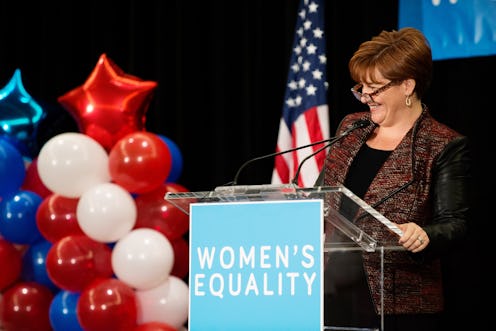News
Women's Equality Party Win A Spot On The Ballot
Don't look now, New Yorkers, but there's about to be a new political party on your ballot — the Women's Equality Party won a New York ballot line, after the New York Board of Elections tallied up more than 50,000 votes for the Gov. Andrew Cuomo/Lt. Gov Kathy Hochul ticket placed under the fledgling party's title. Passing that threshold means that the so-called WEP will maintain a presence on New York state ballots for at least the next four years. And while that sounds like an unabashedly positive development, in truth, reaction to the new party amongst left-wing political observers is mixed.
Spearheaded by Cuomo himself, and led by former New York City Council speaker Christine Quinn, the Women's Equality Party takes advantage of a unique rule in the state's politics — third parties are allowed to endorse major party candidates, and secure an ongoing spot on the ballot if enough people cast their votes under that banner. As such, you could actually vote for Cuomo and Hochul in Tuesday's election as candidates for the Democratic Party, Women's Equality Party, or the Working Families Party. It allows third parties to gain political influence without having to go head-to-head against, in this case, an incumbent governor sure to be reelected.
But it's the divide between those two third parties — Women's Equality and Working Families — where the controversy comes into play. Cuomo has been repeatedly accused of creating the former to diminish the power of the latter, which has pushed him to stake out more liberal positions on a host of issues, equal pay for women among them. Before the gubernatorial primary race, in fact, the Working Families Party nearly gave their endorsement to rising political star Zephyr Teachout, instead of the massively powerful Cuomo, but ultimately deferred to the incumbent.
In The Nation, Michelle Goldberg laid out what you might consider a baseline feminist opposition to the Women's Equality Party — she argues that Cuomo cravenly leveraged feminism to bolster his own power, and betrayed an existing liberal third party with a history of championing progressive causes, including for women.
In actual fact, however, the Women’s Equality Party, which was founded by New York Governor Andrew Cuomo in July, seems inspired by nothing so much as his desire to undermine the progressive Working Families Party. ... his economic policies have hit New York’s women, who are more likely than men to live in poverty, especially hard. According to the National Women’s Law Center, about six in ten of New York’s minimum-wage earners are women. Cuomo fought efforts at a meaningful raise in the minimum wage, only changing his stance when the Working Families Party forced his hand.
This is by no means a consensus opinion, however, and a great number of people are enthusiastic about the Women's Equality Party — its platform, centered around passage of the Women's Equality Act, a ten-point bill which would secure rights and protection for New York women in numerous ways, including reproductive health and equal pay. Christine Quinn spoke to Bustle about this last week, and she claimed that the two left-wing coalitions could co-exist.
In the same that the Democratic Party and the WFP have coexisted in New York. They can coexist, cooperate, collaborate, make each other stronger and bring more results for women and girls, as well as more direct policies for women and girls in New York. That’s what we’re trying to accomplish here.
There's no doubt that it's a role Quinn is well-suited for, and indeed, the Women's Equality Act is a must-pass kind of bill.
But in all honesty, there is at least one thing that would make Cuomo's embrace of a deliberately pro-woman political party a little more convincing — if he had acknowledged Democratic challenger Zephyr Teachout, a woman who ultimately carried 35 percent of Democratic primary voters, before her campaign was over. If he had agreed to even one debate with her, or had even been willing to say hello to her when they crossed paths at the New York City Labor Day parade back in September (though in fairness, New York City Mayor Bill de Blasio gave her the cold shoulder as well). It'll be very interesting to see how this internal conflict on the left plays out over the next few years.
Images: Getty Images (2)
